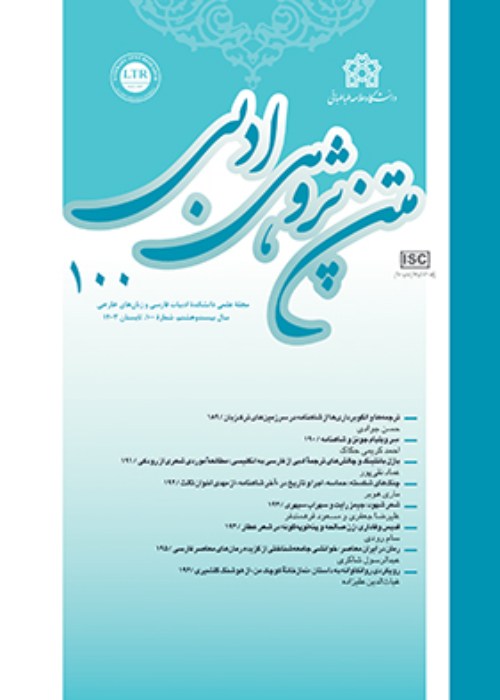Examining the Characteristics of Spoken Language in the Contemporary Poetic Movements (From Mashrute to Warfare Poetry)
Author(s):
Abstract:
The spoken language is a kind of existing languages which has been identified more through the contemporary poetry of Iran. However, despite its salient presence in the poetry of this period, the stages and aspects of this characteristic have not been investigated thoroughly. This study is an attempt to examine the poets whose poetries have manifested an extensive use of the spoken language more than others through well-known movements of poetry. The Mashrute period seems to be a turning point for poetry in entering to the realm of commoners and approaching the commonplace languages. Traditionalists in the poetry movements, which emerged after Mashrute, have included some elements of conversational language in poetry, in order to avoid obsolescence and imitation. Romanticism is more inclined to classical and aesthetic but simple languages, in both social and romantic branches. The Spoken language has officially been individuated in the social symbolism. However, symbolists don’t have a mere popular language, but in the frameworks of literary scales, have taken advantage of the elements of spoken language. The climax of this movement was the innovative experiences of Nima. He took the first serious step in this field, and has developed an extensive set of names of his surrounding phenomena in poetry and made use of spoken syntactic structures in accordance with other poetry elements. This process continued after him in the works of his successors, especially in Foruq Farrokhzad. Her poetry is based on the spoken language and has become an appropriate prototype for the poets of next decades to approximate poetry to spoken language. Despite the novel dimension and trends in the grammatical system, poets have used usual and current words. However, in the literary and grammatical system they keep a distance from the conversational language and intentionally endeavor to complicate the language of their poems. On the other hand, after the Islamic Revolution poetry has again approximated the spoken language through novel movements such as resistance poetry movement especially the modernists.
Language:
Persian
Published:
Literary Text Research, Volume:15 Issue: 47, 2011
Page:
9
magiran.com/p947305
دانلود و مطالعه متن این مقاله با یکی از روشهای زیر امکان پذیر است:
اشتراک شخصی
با عضویت و پرداخت آنلاین حق اشتراک یکساله به مبلغ 1,390,000ريال میتوانید 70 عنوان مطلب دانلود کنید!
اشتراک سازمانی
به کتابخانه دانشگاه یا محل کار خود پیشنهاد کنید تا اشتراک سازمانی این پایگاه را برای دسترسی نامحدود همه کاربران به متن مطالب تهیه نمایند!
توجه!
- حق عضویت دریافتی صرف حمایت از نشریات عضو و نگهداری، تکمیل و توسعه مگیران میشود.
- پرداخت حق اشتراک و دانلود مقالات اجازه بازنشر آن در سایر رسانههای چاپی و دیجیتال را به کاربر نمیدهد.
In order to view content subscription is required
Personal subscription
Subscribe magiran.com for 70 € euros via PayPal and download 70 articles during a year.
Organization subscription
Please contact us to subscribe your university or library for unlimited access!



